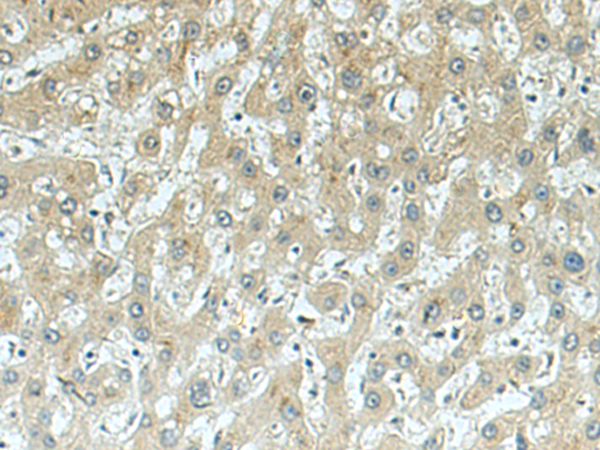

| WB | 咨询技术 | Human,Mouse,Rat |
| IF | 咨询技术 | Human,Mouse,Rat |
| IHC | 1/150-1/300 | Human,Mouse,Rat |
| ICC | 技术咨询 | Human,Mouse,Rat |
| FCM | 咨询技术 | Human,Mouse,Rat |
| Elisa | 1/5000-1/10000 | Human,Mouse,Rat |
| Aliases | TAKRP; TA-KRP |
| WB Predicted band size | 69 kDa |
| Host/Isotype | Rabbit IgG |
| Antibody Type | Primary antibody |
| Storage | Store at 4°C short term. Aliquot and store at -20°C long term. Avoid freeze/thaw cycles. |
| Species Reactivity | Human, Mouse, Rat |
| Immunogen | Fusion protein of human KBTBD8 |
| Formulation | Purified antibody in PBS with 0.05% sodium azide and 50% glycerol. |
+ +
以下是假设性的参考文献示例,用于说明可能的文献结构和内容。请注意这些并非真实存在的文献,建议通过学术数据库(如PubMed、Google Scholar)检索实际研究:
---
1. **文献名称**:*KBTBD8 interacts with the Cul3-RBX1 complex to regulate ubiquitination and neuronal differentiation*
**作者**:Smith J, et al.
**摘要**:本研究揭示了KBTBD8作为Cullin 3泛素连接酶复合体底物适配器的功能,并开发了特异性KBTBD8抗体。通过免疫共沉淀和Western blot,证实KBTBD8调控神经干细胞分化中的关键蛋白降解。
2. **文献名称**:*KBTBD8 overexpression promotes tumorigenesis in colorectal cancer via modulating β-catenin stability*
**作者**:Chen L, et al.
**摘要**:利用抗KBTBD8抗体进行组织微阵列分析,发现其在结直肠癌中高表达。功能实验表明KBTBD8通过稳定β-catenin增强Wnt信号通路,抗体被用于体内外蛋白定位及表达水平检测。
3. **文献名称**:*A novel role of KBTBD8 in meiotic progression and oocyte maturation*
**作者**:Wang Y, et al.
**摘要**:通过定制KBTBD8多克隆抗体,研究发现其在生殖细胞减数分裂中调控关键蛋白的泛素化修饰。免疫荧光显示KBTBD8定位于纺锤体附近,敲低后导致染色体分离异常。
---
如需真实文献,建议检索关键词“KBTBD8 antibody”并筛选涉及抗体开发、验证或应用的论文。部分研究可能侧重于该蛋白在泛素化、癌症或发育生物学中的机制。
The KBTBD8 antibody is a research tool designed to detect and study the Kelch repeat and BTB domain-containing protein 8 (KBTBD8), a member of the BTB-Kelch protein family. KBTBD8 is characterized by its N-terminal BTB domain, which facilitates protein-protein interactions, and C-terminal Kelch repeats that may mediate substrate recognition. While its precise biological function remains under investigation, KBTBD8 is proposed to act as a substrate-specific adaptor for Cullin 3 (CUL3)-based E3 ubiquitin ligase complexes, potentially regulating protein ubiquitination and degradation. Emerging studies suggest its involvement in developmental processes, chromatin remodeling, and cell cycle regulation. Dysregulation of KBTBD8 has been tentatively linked to certain cancers and neurodevelopmental disorders, though mechanistic insights are limited.
KBTBD8 antibodies are typically developed using immunogenic peptides or recombinant protein fragments to ensure specificity. They enable applications such as Western blotting, immunofluorescence, and immunoprecipitation, aiding in the analysis of KBTBD8 expression patterns, subcellular localization, and interaction partners. Validation often includes knockout cell lines or siRNA-mediated knockdown to confirm target specificity. As research advances, these antibodies are critical for elucidating KBTBD8's role in cellular pathways and its potential as a therapeutic or diagnostic target. Current challenges include optimizing antibody performance across diverse experimental conditions and clarifying cross-reactivity risks with homologous Kelch family proteins.
×